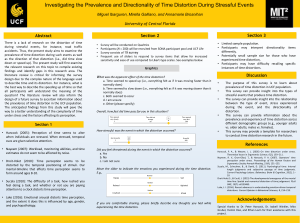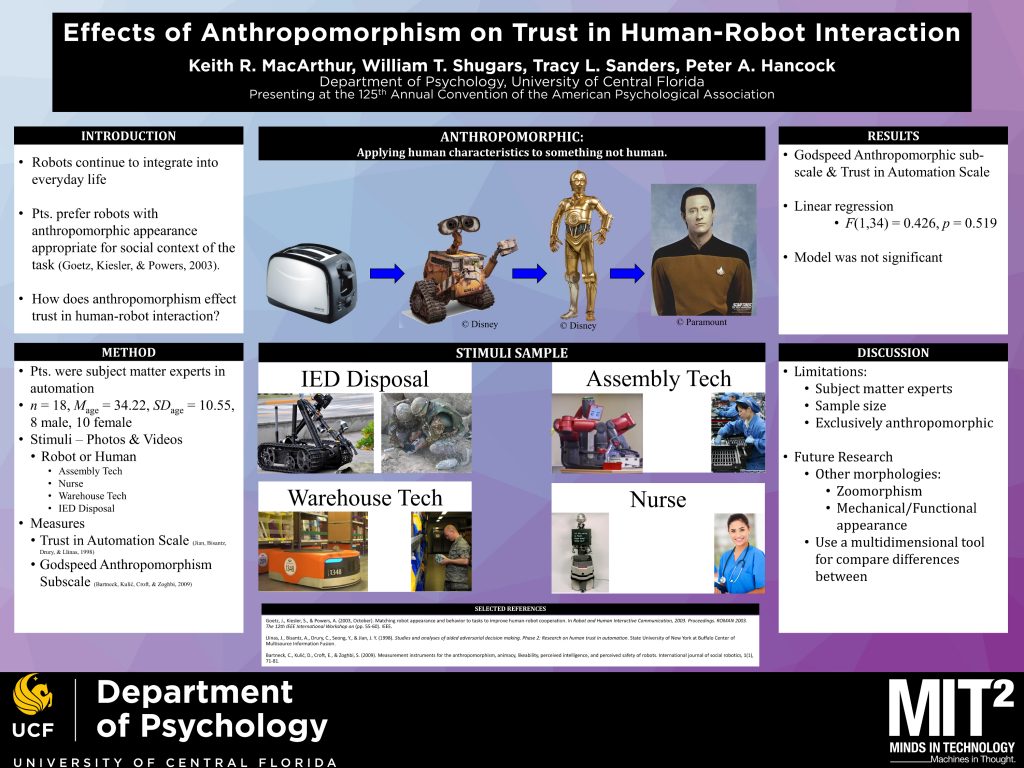
Ibarguren, M., Galliano, M., & Brosnihan, A. (March, 2022). Investigating the prevalence and directionality of time distortion during stressful events. Presented at the UCF Student Scholar Symposium, Orlando, FL.


Ibarguren, M., Galliano, M., & Brosnihan, A. (March, 2022). Investigating the prevalence and directionality of time distortion during stressful events. Presented at the UCF Student Scholar Symposium, Orlando, FL.

MacArthur, K. M., Shugars, W. T., Sanders, T., & Hancock, P. A. (August, 2017). Effects of anthropomorphism on trust in human-robot interaction. Presented at the 125th Annual meeting of the American Psychological Association, Washington, D. C.
The purpose of this study has been to investigate a possible shift in thinking that has occurred since the onset of the Internet and related technology, specifically it examines whether preference for transactive memory system types (either book- or computer-related) varies with age.
Authors: Jessica Siler, Ben D. Sawyer, & P.A. Hancock
Presented at the Showcase of Undergraduate Research Excellence at UCF
Past research has shown reduced driving decrement when T9 (assisted text entry) was used, as compared to multi-tap (unassisted text entry) conditions. Yet, the results of this study contradict those past; T9 appears to provide no significant benefit to texting while driving. This finding could point to a population shift – T9 is no longer widely used, so its benefits are not seen. Further research should be conducted with other forms of text entry or other predictive texting programs, such as iTap, Swype, and Siri.
Authors: Jessica Siler, Daniel Hinton, and Kevin Ortiz-Diaz
Presented at the Human Factors and Applied Psychology Student Conference
Change Blindness is the failure to detect a change made to a scene or object between views. It is often considered to be caused by a lack of attention. However, could the physiological limitations of vision also contribute to this phenomenon? This study had participants look for differences between two images while recording their eye movements with an eye tracker. We found that when participants were given more time to search for changes, they found significantly more changes. However, the number of changes found only increased for changes which the participants looked at directly. This suggests that there is a physiological as well as an attentional contribution to change blindness.
Authors: Elisabeth Niederman, Ben D. Sawyer, and P. A. Hancock
Presented at the Showcase of Undergraduate Research Excellence at UCF
Dress for Success.” Most of us have heard the saying. However, it isn’t just the type of clothing you wear that matters — it also matters how you wear it. In this study, participants rated portraits of neatly and messily dressed individuals. Individuals wore the same clothing in both the neat and messy portraits, and and gestures and smiling were standardized in all portraits. We found that neat portraits were rated as significantly more organized and intelligent and less extroverted. This may mean that job interviewers and teachers might favor applicants and students with neater dress. So next time you want to impress someone, keep in mind the neatness of your dress.
Authors: Elisabeth Niederman, Jennifer Price, Ben D. Sawyer, and P. A. Hancock
Presented at The Human Factors and Applied Psychology Student Conference